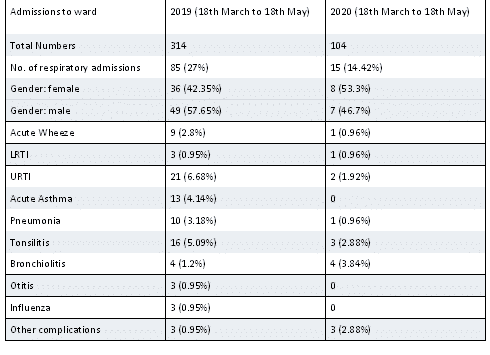
The Impact of COVID 19 Lockdown on Acute Asthma/Wheeze Admissions
2Paediatrics, Wexford General Hospital, Wexford, Ireland
Background: In Ireland, the first COVID 19 National lockdown was between 18/03/2020 and 18/05/2020. During this period of time schools, restaurants, pubs had been closed and you were allowed to go outside your home in the range of 5 km for essential shopping and exercise.
Objectives: To evaluate the impact of the National lockdown on acute asthma/wheeze admissions to the children’s ward St Luke’s Hospital Kilkenny during that period compared with the corresponding period of the previous year.
Methods: We conducted a retrospective study of admissions to our Paediatric ward during the period from 18th March to 18th May for the COVID-19 pandemic year 2020 and compared to corresponding period in 2019. We accessed the iPiMS system to collect the data. No chart review has been done.
Conclusions: In 2019, just over 1/4th (27%) of admissions to our children’s ward were due to respiratory illnesses. Acute asthma/Wheeze formed about 7% of these admissions. Whereas during the National lockdown period form 18th March 2020 to 18th May 2020 respiratory illness resulted in less than 1/6th of admissions. Acute asthma / wheeze formed less than 1% of admissions to our ward.
The probable reasons for this very low rate of acute asthma/acute wheeze admissions to hospital is related to the limited exposure to infectious diseases and the fall in environmental pollution. The fact that children were mostly indoors would also suggest that outdoor pollution may play a significant part in triggering asthma attacks compared to indoor pollution/allergens during this season. It is possible that asthmatic patients were using their preventer medications regularly during this period as a result of heightened awareness. It may also be the case that children with acute asthma/wheeze were treated as out patients from primary care as well as from the paediatric assessment unit.

Powered by Eventact EMS